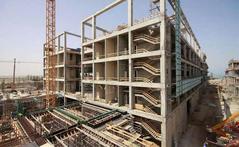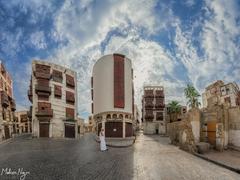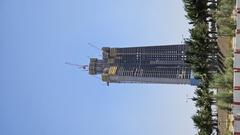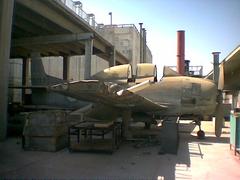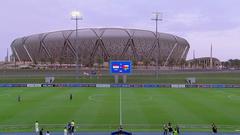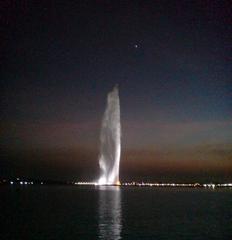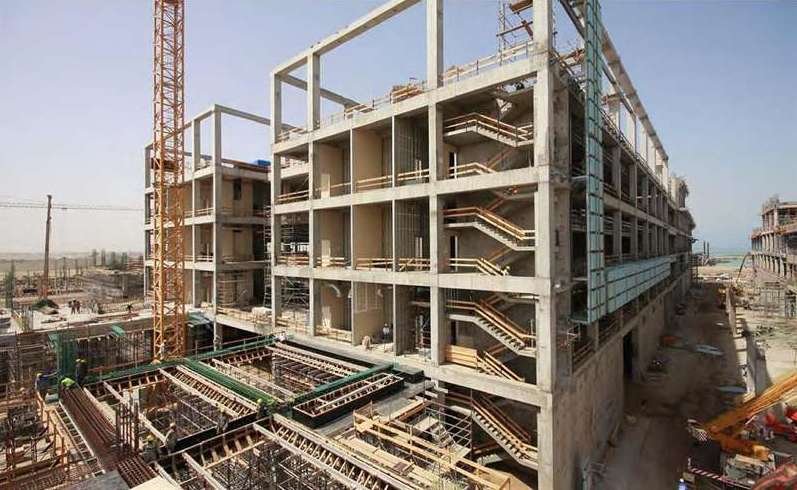
King Abdullah University of Science and Technology (KAUST) Visiting Guide: Tickets, Hours, and Tips
Date: 14/06/2025
Introduction: History and Significance
Situated on the scenic Red Sea coast near Jeddah, Saudi Arabia, King Abdullah University of Science and Technology (KAUST) stands as a symbol of scientific advancement, sustainable architecture, and cultural inclusivity. Established in 2009 by the late King Abdullah bin Abdulaziz Al Saud, KAUST was envisioned as a world-class research-intensive institution with a mission to push scientific boundaries and foster social progress (KAUST About; ArchDaily).
The campus features architectural marvels inspired by traditional Arabic forms—including Bedouin tent–like roof structures and intricate mashrabiya latticework—integrated within a LEED Platinum–certified, environmentally conscious environment (HOK; KAUST Sustainability). Visitors can discover cultural highlights such as the Museum of Science & Technology in Islam and enjoy the university’s proximity to the vibrant city of Jeddah, known for its UNESCO-listed Al-Balad district and the picturesque Jeddah Corniche (KAUST Visitor Information Page; ArchDaily).
This comprehensive guide provides essential details for planning your visit, covering campus history, ticketing, opening hours, architectural features, sustainability initiatives, nearby attractions, accessibility, and travel tips.
Quick Contents
- Introduction
- Origins and Founding Vision
- Visiting Information: Hours, Tickets, and Tours
- Architectural and Cultural Highlights
- Campus Design and Sustainability
- International Community and Social Impact
- Research and Technological Innovation
- Visitor Experience and Accessibility
- Exploring Jeddah and Nearby Attractions
- Frequently Asked Questions (FAQ)
- Conclusion and Planning Your Visit
- References
Origins and Founding Vision
Founded in 2009 by King Abdullah bin Abdulaziz Al Saud, KAUST was established to accelerate scientific discovery in Saudi Arabia and worldwide (KAUST About). The campus covers approximately 6.5 million square feet and was the first in the Kingdom to receive LEED Platinum certification, reflecting its dedication to sustainability (ArchDaily).
Located north of Jeddah, the campus fosters international collaboration in a serene setting, featuring state-of-the-art laboratories, research centers, a comprehensive library, and inclusive residential communities.
Visiting Information: Hours, Tickets, and Tours
Visiting Hours:
KAUST welcomes visitors from Sunday to Thursday, 9:00 AM to 5:00 PM. Always verify hours on the official website, as special events or holidays may affect availability.
Entry and Tickets:
Admission is free, but advance online registration is required to obtain a visitor’s pass for security and tour participation.
Guided Tours:
Guided tours showcase the campus’s architectural highlights, research facilities, and cultural landmarks such as the Museum of Science & Technology in Islam (MOSTI). Advance booking is necessary.
Accessibility:
KAUST is fully accessible with wheelchair-friendly pathways, ramps, and clear signage.
For up-to-date visitor details and to register, visit the KAUST Visitor Information Page.
Architectural and Cultural Highlights
KAUST’s campus is a fusion of contemporary sustainability and traditional Islamic architecture. Notable features include:
- Monumental Roofs: Inspired by Bedouin tents, these structures provide shade and support solar panels (HOK).
- Mashrabiya Screens: Intricate latticework shades windows and skylights, reducing glare and heat (Archello).
- Natural Ventilation: Solar-powered wind towers and canals enhance airflow and comfort across the campus.
- MOSTI: The Museum of Science & Technology in Islam celebrates historic contributions of Muslim scholars (KAUST About).
Campus Design Philosophy and Sustainability
KAUST’s design, crafted by HOK, embodies a “meta-building” concept—an interconnected structure integrating academic, research, and community spaces (HOK). The campus master plan prioritizes walkability, shaded courtyards, and green spaces, minimizing sun exposure and promoting energy efficiency (ArchDaily; Archello).
Sustainability Initiatives
- Energy Efficiency: Advanced MEP systems, chilled beams, heat recovery, and solar arrays reduce energy consumption (Archello).
- Water Conservation: Low-flow fixtures, greywater recycling, and native landscaping minimize water use (KAUST Sustainability).
- Sustainable Materials: Use of local and recycled materials, plus robust waste management protocols (Archello).
- Community Revitalization: Pedestrian-friendly streets, cycling lanes, and inclusive facilities promote a vibrant, sustainable community (KAUST Sustainability; KAUST Community Life).
KAUST’s campus was recognized among the world’s Top Ten Green Projects in 2010 by the American Institute of Architects Committee on the Environment (Archello).
International Community and Social Impact
KAUST is a multicultural hub, home to over 120 nationalities. The university’s mixed-gender educational environment was a first in Saudi Arabia, promoting openness and modernization. English is the official language of instruction, and the campus is renowned for initiatives supporting women in STEM (Sapienza University).
Cultural exchange is fostered through festivals, workshops, and international events, including the 2025 Times Higher Education World Academic Summit.
Research and Technological Innovation
KAUST’s research facilities are among the most advanced in the region:
- Shaheen Supercomputer: One of the Middle East’s most powerful computational resources.
- Nanofabrication and Marine Labs: Support innovation in renewable energy, water desalination, and climate research (Amellie.net).
- Flexible Lab Spaces: Universal floor plates and adaptable building shells foster interdisciplinary collaboration (HOK).
Visitor Experience and Accessibility
Visitors enjoy a host of amenities:
- Visitor Center: Information desks and orientation services.
- Dining: Cafes and restaurants with local and global cuisine.
- Recreation: Parks, sports complexes, walking trails, and a hotel for overnight stays.
- Accessibility: Wheelchair-friendly paths, ramps, and parking.
Guided tours are available upon reservation, and photography is permitted in public areas.
Exploring Jeddah and Nearby Attractions
Enhance your KAUST visit with trips to:
- Al-Balad: Jeddah’s UNESCO World Heritage old town, famed for coral stone buildings and bustling souks.
- Jeddah Corniche: A scenic waterfront promenade with parks, dining, and public art.
- King Fahd Fountain: The world’s tallest fountain, a Jeddah landmark.
Outdoor enthusiasts can also explore the Red Sea coast for snorkeling, diving, and beach activities.
Travel Tips
- Getting There: KAUST is about 100 kilometers north of Jeddah. Private transport is recommended; shuttle services may be available.
- Weather: Wear sun protection and comfortable shoes; stay hydrated.
- Dress Code: Modest attire is advised; KAUST’s campus is more relaxed than many public spaces in the Kingdom.
- Booking: Always register and book tours in advance.
Frequently Asked Questions (FAQ)
Q: What are KAUST’s visiting hours?
A: Sunday to Thursday, 9:00 AM to 5:00 PM (confirm during public holidays or events).
Q: Is there an entry fee?
A: Entry is free, but online pre-registration is required.
Q: Are guided tours available?
A: Yes, guided tours must be booked in advance.
Q: Is the campus accessible for visitors with disabilities?
A: Yes, KAUST is fully wheelchair accessible.
Q: How do I get to KAUST?
A: Accessible by car or taxi from Jeddah; limited public transport.
Q: What attractions are nearby?
A: Al-Balad, Jeddah Corniche, King Fahd Fountain, and the Red Sea coast.
Q: Can I take photographs?
A: Yes, in public areas; always respect privacy and any posted restrictions.
Visuals

Caption: KAUST campus showcasing sustainable architecture and Red Sea views.

Caption: Scenic Jeddah Corniche, a short drive from KAUST.
Conclusion: Plan Your Visit
King Abdullah University of Science and Technology is a model for the integration of science, sustainability, and cultural progress. Whether you are an academic, a prospective student, or a curious traveler, KAUST offers a forward-looking, inclusive, and environmentally conscious experience. Combine your campus exploration with a visit to Jeddah’s historical sites and the stunning Red Sea coast for a rich and memorable trip.
For the latest visitor information, including tour bookings and event updates, visit the official KAUST visitor page or KAUST Sustainability. Download the Audiala app for travel recommendations and follow us on social media for the newest tips and events.
References and Further Reading
- King Abdullah University of Science and Technology About
- King Abdullah University of Science and Technology Campus Architecture - ArchDaily
- King Abdullah University of Science and Technology Sustainability
- King Abdullah University of Science and Technology Projects - HOK Architecture
- Visiting KAUST: History, Tickets, Hours, and Attractions near Jeddah - Audiala Travel Guide
- KAUST Community Life
- Archello: King Abdullah University of Science and Technology
- Sapienza University: Visiting Student Research Program
- Amellie.net: A Visit to KAUST
